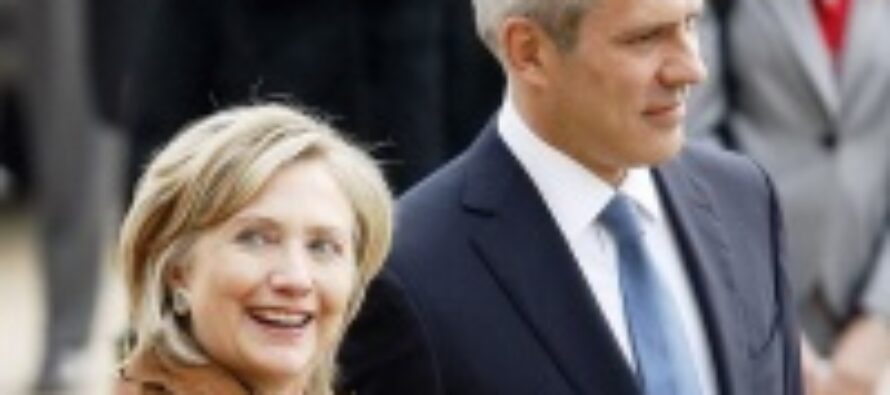Clinton Urges Bosnians to Reject Nationalism, Adopt Reforms

![]()
U.S. Secretary of State Hillary Clinton spoke in Sarajevo and urged Bosnians to “reject the false promise of self-serving nationalist agendas” and push forward with reforms.
Sabina Arslanagic

After meeting with top government officials and speaking to university students, Clinton opened the new United States embassy in Sarajevo.
In a speech at the new embassy, Clinton told those gathered that she had urged the students, as she urged every citizen, “to reject the false promise of self-serving nationalist agendas, those will lead only to more distrust, disunion, stagnation and poverty.
“No one will create a stable and prosperous future for this country stoking the animosities of the past… The only way forward lies in working together toward shared aspirations so you can create jobs, attract investment, and build a better life for everyone.”
She encouraged the newly elected Bosnian leaders, many of whom were present at the embassy, “to reflect the interest of the voters by moving promptly to form an inclusive and functional government and then proceeding with consitutional reform.”
Clinton’s arrival in Bosnia comes two weeks after the country held presidential and parliamentary elections. The results of the polls are likely to produce more political deadlock as the newly elected leaders hold widely disparate views on the country’s future.
While the country’s Bosniaks largely turned to moderate politicians who favor a more unified country, the Croat and Serb communities have re-elected their nationalist parties.
This is likely to make impossible the formation of a government able to effectively address the burning social and economic problems in the country and reach compromises on reforms.
Clinton referenced past American support for Bosnia and said that the United States would continue to support Bosnian efforts to reform the country, but stressed that the changes must be initiated and carried out by Bosnians themselves.
“We believed then, as we do now, that the future of Bosnia lies at the heart of an integrated and democratic Europe and we stand ready to help you achieve our common goal… a Bosnia and Herzegovina that is firmly anchored in the EU and NATO….”
She continued: “Only the leaders and the people of this country can make that happen. It will take hard work and leadership and willingness to compromise, determination to see through difficult reforms and understanding that democracy can never be winner takes all.”
Clinton’s speech was not warmly received by some of the Bosnian leaders present. Folllowing her remarks Bosnian Serb leader Milorad Dodik said he did not believe the country’s constitution needed to be reformed.
“What we need to do is give more power to the entities…and we will push forward the idea to give Bosnia’s constituent [Bosniak, Croat and Serb] people the right to self-determination,” Dodik told journalists.
The US-brokered Dayton peace agreement which ended Bosnia’s 1992-95 war, left the country split in two highly autonomous parts, the Serb majority Republika Srpska and Croat-Bosniak federation, linked by weak central institutions.
Despite 15 years of peace, Bosnian Serbs still harbor dreams of independence and the threats of Republika Srpska’s secession were a major part of the pre-election campaign by the Dodik’s party, the Alliance of Independent Social Democrats, SNSD.
The newly elected Bosniak presidency member, Bakir Izetbegovic, told reporters at the embassy he hoped Dodik would stop talking about secession and focus on the required reforms.
“We should start with the goals we have in common and none of us want new problems, more conflict or to discourage investors,” Izetbegovic said.
For her part, Clinton told some 300 university students she met this morning at the National Theater in Sarajevo that America would continue to support Bosnia’s unity and territorial integrity.
“If you can overcome the reminiscence of divisiveness, there is no limit to your future,” she said.
“If you cannot, then I fear you will find yourself in a state of paralysis and any attempt to be a separate country will fail as there will be no recognition, there will be no willingness to work with that entity,” she added.
The U.S. embassy opened today is the eighth largest American embassy in Europe. It is located on Robert Frasure Street, which has been newly named in dedication to the American diplomat who was killed with two others in an automobile accident in Bosnia in August 1995 while on a mission to negotiate peace in the wartorn country.
Members of Frasure’s family were present at the embassy’s inauguration.
During her Bosnia visit, Clinton also met with the members of the country’s outgoing tripartite presidency, and walked through the city shaking hands with city residents.
Later today she will travel to Belgrade to meet with top Serbian leaders, including Serbian President Boris Tadic and Prime Minister Mirko Cvetkovic.
She will then travel to Kosovo, where she will speak with officials in Pristina. She is also expected to travel to a Serb-majority region to reassure local leaders that the US will insist on the protection of minority rights in Kosovo, where some 90 percent of the population are ethnic Albanians and only ten percent Serbs.
Related Articles
Food scarcity: the timebomb setting nation against nation
![]()
A drying corn field in southern Minnesota. Bad weather has resulted in a poor harvest this year. Photograph: David I.
Drones: A deeply unsettling future
![]()
The rapid expansion of a drone arms race has emerged both domestically and abroad, leaving everyone vulnerable. At least 50 countries
Cambiar el sistema
![]()
Ignacio Ramonet Le Monde Diplomatique Los eurófilos más extasiados lo machacan sin cesar: si no dispusiéramos del euro, dicen, las


